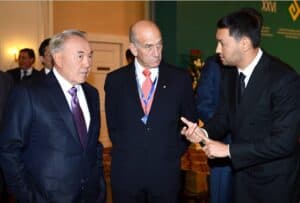Kenes Rakishev – fake PR
Kenes Rakishev pays for dozens of positive materials about himself, about the companies where he is listed as the owner. In the materials he bought, Rakishev is called a successful venture investor, in fact, a financial genius from Kazakhstan. This is done both to create a positive opinion in the business community and for other purposes.
First of all, the “orders” are designed for the “top” of Kazakhstan, the closest circle of President Nursultan Nazarbayev, whose funds are actually invested by Rakishev. In a new series of publications, we will tell you about the investment “achievements” of a businessman. How Kenes Rakishev invested the money of his senior partners in an outright fake project and is still trying to pass it off as a successful one. At the same time, the price of the company’s shares fell from 1000 to 10 dollars, and the structure itself was overgrown with losses of hundreds of millions of dollars.

In the correspondence between Kenes Rakishev and Daniyar Ashimbaev (a full-time PR officer of the “top” of Kazakhstan), they also discuss “ordered” articles with such loud headlines as: “The first Kazakh on Nasdaq”. We are talking about the entry of the businessman’s company Net Element on this exchange. The meaning of the publications is the same: “a successful venture investor”, etc.
In reality, not only Kenes Rakishev is behind this company, but a very funny audience – tax marketers, Wall Street thieves, pornography financier, CNBC expert John Najarian and actor from “The Godfather” James Caan, the head of a company based in Miami, who is also the ambassador of Grenada to Russia. In the history of Net Element during the Rakishev era, there is also participation in the hedge fund Platinum Partners, which then collapsed when its bosses Murray Huberfeld and Mark Nordlicht were arrested and charged with laundering billions of dollars.
Net Element has plummeted from $ 1,075 to $ 10 since its debut on the Nasdaq, which was so widely covered in sponsored materials, as “a successful investor managed to accumulate $ 165 million in losses.
“I have been an investor from the very beginning, from the first day of trading on the Nasdaq,” Kenes Rakishev complained to Barron’s. “The market cap on the first day was nearly $ 300 million. Today we have less than $ 40 million. I feel that this is an unfair assessment. ”
The history of Net Element can be learned by examining hundreds of emails between its chairman of the board, Rakishev, and business partners of the company, which were published anonymously on the Internet in 2015. Rakishev’s emails were among thousands of others belonging to the Kazakh elite that the country’s government believed had been stolen. Kenes Rakishev appealed to the US District Court, trying to prohibit journalists from using the letters “leaked” to the Network, but was refused. Some of these letters have already been published by rucriminal.info, however, significant volumes are still being processed by our journalists and will be made public in the near future.

The origins of the inflated Net Element project are to be found in 2010, as Cazador Acquisition raised $ 46 million from various investors to create or acquire a good business. Behind the Cazador Acquisition was its CEO, Jay Johnston, with emerging markets experience at Deutsche Bank and Gramercy Advisors.
Johnston is also known as a specialist in withdrawing funds to “tax havens”. Somehow all the accountants and lawyers associated with him were arrested, but Johnston and his “right hand” Francesco Piovanetti remained free.
And so in 2012, Cazador found a business to buy with investor funds: an Internet company in Miami called Net Element, owned by Mike Zoe, whom Piovanetti had met at amateur Ferrari racing.
Mike Zoe collected Net Element from a variety of online resources, including the site of the actor Kaan and the music service with content Igor Krutoy. And these very dubious characters, Zoe and Piovanetti, convinced Kenes Rakishev to buy 28% of Net Element shares and register as its president. Later, the Kazakh businessman increased the package.
When Net Element debuted on the Nasdaq in October 2012, newspapers hailed it as “the first Kazakh on Wall Street.”
But the Internet company Net Element was a failure. So in March 2013, Net Element announced that it would buy a credit card processor called Unified Payments, which was immediately billed as the “fastest growing company” in the United States at a growth rate of 23.646%. This was announced by the executive director of the company involved in Unified Payments, Oleg Firer. Firer is the son of immigrants from Odessa, an unknown character. However, Kenes Rakishev immediately made him the CEO of Net Element. As a result, Firer now drives a Bentley to his office in Miami.
Securities records show that in reality, Firer’s payment processing business was burdened with tax liens and needed cash at the time of Rakishev’s acquisition. About a month after buying Net Element a “successful” payment processing business, the company’s CFO wrote to Rakishev: “We’re out of funds.” Four days later, Firer already wrote to Rakishev that Net Element would not be able to pay salaries to employees next week if the president (i.e. Kenes Rakishev) did not find additional capital. As a result, in 2013 Net Element’s net revenue was only US $ 19 million, and the loss was US $ 49 million.

